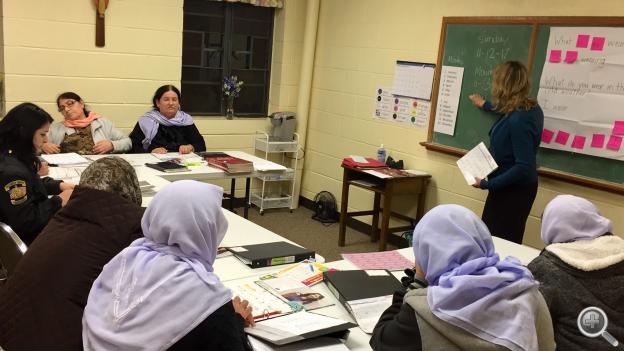A small classroom down a hall at St. Matthews Episcopal Church in Lincoln is a long way from Iraq, but this is where a group of Yazidi women find themselves. They’re part of a class led by volunteer Terri Hensley, a former teacher who’s helping them learn English.
“We are learning consonants and vowels and we are starting right from scratch, so it is a very slow process,” Hensley said.
These woman are mostly from an area in northern Iraq, but Yazidis have also lived in parts of Syria and Turkey. They’re both an ethnic and religious minority and have faced persecution for decades, most recently at the hands of ISIS. They began arriving in Nebraska several decades ago as part of the refugee resettlement process.
Gulie Khalaf is Yazidi and arrived in the U.S. from Syria in 1998. She moved from Atlanta to Buffalo and then to Lincoln, a place where it seems many Yazidi refugees end up. There are now more than 2,000 here.
“Even though the resettlement office settles Yazidis elsewhere, they end up a year later or even six months later, giving up whatever they have collected and they end up coming to live here in Nebraska,” Khalaf said.
She now spends most of her time helping Yazidi refugees get used to their new lives in Nebraska. She’s at the church two nights a week helping older Yazidi women learn English and even learn how to drive. Aishe Morad arrived in Lincoln eight years ago from Iraq. She speaks Kurdish in a dialect known as Kurmanji.
“We used to live in South Dakota but we ended up moving to this state because of how open people seem to be, how friendly they are,” Morad said through an interpreter. “Anybody that we see, anything that we do, there’s always thankfulness. Thank you, we hear it often. There’s a lot of help for us.”
Qaseema Ali is also from Iraq and has been in Lincoln for almost a decade. Dressed in traditional Yazidi clothing, she’s held on to as much of her culture as she can. But she says Lincoln has become home, a familiar place where she’s safe and happy.
“It’s not strange at all,” Ali said through an interpreter. “It’s a small place, but to me it’s a comfortable place.”
Khalaf says programs like this one have made what can be a lonely transition a bit easier for these women.
“They were these ladies who took care of their families and were confident in their ability to do it well. And now they’re here. Reading, they cannot do. Writing, they cannot do. Driving, they can’t do,” she said. “So basically they end up being sort of mute, not able to see and if you cannot drive, it’s equivalent to not having feet.”
For Lacey Studnicka, making refugees feel welcome is her job. She’s the director of advancement in the refugee program at Lutheran Family Services, the largest refugee resettlement agency in Nebraska. She says Lincoln has a good reputation among Yazidi refugees.
“It’s a great place for refugees to come. Very welcoming,” Studnicka said. “Wonderful infrastructure of social services that are there to serve refugee populations, great church support and just people are welcoming.”
Studnicka says recent refugee restrictions from Muslim countries have drastically reduced the number of Yazidis coming to Nebraska, from around 80 a month a few years ago to just two or three a month since late last year. Despite the slowdown, she’s never seen as much support for refugees in Nebraska as she’s seeing now.
“We have hundreds of volunteers, churches and synagogues and mosques who want to have their doors open. We have people waiting,” she said. “And so, that’s been really the beauty that’s come out of that, is people are really being called to action.”
It doesn’t surprise Lincoln Mayor Chris Beutler that Yazidis feel at home here. Nebraska has a long history of welcoming immigrants and the city goes out of its way to make legal immigrants and refugees feel like they’re a part of the community.
“We want to be a place that’s known to treat people fairly whether they were born here or came here as legal immigrants,” Beutler said. “That pride in looking at people as individuals and not as good or bad by virtue of being a part of some culture I think has always been a strong point of our region of the country and of our state and our community.”
Back at St. Matthews Episcopal Church in Lincoln, English teacher Terri Hensley says getting to know her Yazidi students makes her appreciate what they’ve been through to get here.
“Once you meet these women, you really love them. They are wonderful ladies,” she said. “I can’t imagine their story. I thought I had it hard being raised with 13 siblings, but nothing compared to what these ladies have seen.”
What they see now is a new and optimistic future in Nebraska, a home away from home that’s become a place they don’t want to leave.


